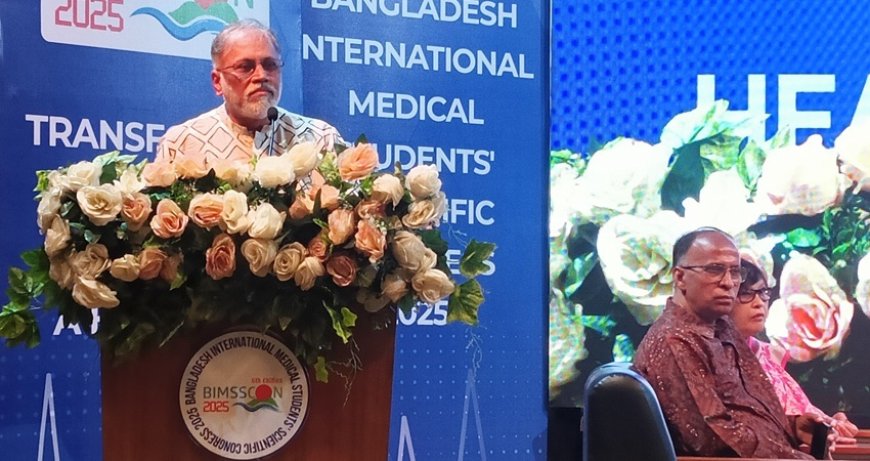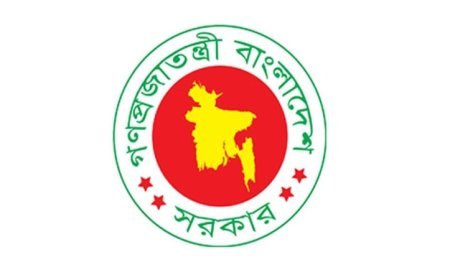Outdated Medical Education Risks Technological Obsolescence: CA Spec Asst
Outdated Medical Education Risks Technological Obsolescence: CA Spec Asst

Outdated Medical Education Risks Technological Obsolescence, Says CA Special Assistant
Professor Dr. Md Sayedur Rahman, Special Assistant to the Chief Adviser (CA) of the Interim Government, warned that outdated medical education could lead to technological obsolescence.
He delivered this message during his chief guest address at the 6th edition of the Bangladesh International Medical Students' Scientific Congress (BIMSSCON) on Friday morning at the International Mother Language Institute in Dhaka.
The event, themed "Transforming Healthcare: Towards a Healthier Future", was organised in partnership with The Daily Observer. Healthcare reform proposals have emerged directly from medical students preparing to serve the nation’s 180 million citizens, while interim government initiatives are showing tangible results despite immense challenges, including overcrowded medical facilities.
Professor Dr. Rahman emphasised the importance of prescription accessibility, stating that clinical benefits materialise only when patients understand written instructions. Otherwise, years of medical education risk being ineffective.
He noted that the current healthcare education system still relies on century-old philosophies, which urgently require technological updates. He predicted that tasks like image interpretation could become automated within the next four years.
The Special Assistant encouraged leveraging global connectivity and virtual reality for hands-on medical training while decentralising healthcare services beyond central hospitals such as Kurmitola Hospital nationwide.
"Bangladesh is now entering a transformative phase. Through your collective efforts, we will build a healthier and stronger nation," he said.
Professor Dr. Nazmul Hossain of the Directorate General of Medical Education (DGME) highlighted that Bangladesh currently operates 110 medical colleges, averaging one institution per 500 square kilometres. However, growing population and rising healthcare demands require continued expansion of both capacity and quality.
He stressed that internship programs bridge academic learning with real-world experience, fostering confidence and competence among young doctors. "Research remains the foundation of progress, as medicine stagnates without scientific inquiry," he added.
"The future of healthcare in Bangladesh depends on how well we integrate education, research, and service. Every medical graduate must not only be academically qualified but also inspired to make a lasting contribution to our people’s well-being," Dr. Hossain said.
Keynote speaker Professor Dr. Tasnim Ara, surgical oncologist, physician-scientist, and CEO of Salima Institute for Cancer Immunotherapy and Cell Therapy (SIFCIACT) and BioMed Diagnostics, addressed healthcare inequality. She noted that while wealthy patients travel abroad to India or Thailand for advanced treatment, many cannot access similar care.
Bangladesh lags behind advanced nations in medical technology, research infrastructure, and specialised care. Yet, a talented and passionate youth cohort offers hope for bridging these gaps. She urged medical students studying abroad to return home equipped with knowledge, innovation, and experience.
"This country needs you. Through dedication, collaboration, and research, we can transform Bangladesh into a centre of excellence in cancer immunotherapy, cell therapy, and advanced diagnostics. The journey may be long, but the future is within our reach," Dr. Tasnim Ara emphasised.
The International Medical Students Empowerment Network Bangladesh (IMSEN), with the motto "Empowering Medicos", organised the 6th edition of BIMSSCON. The event was chaired by Raziul Islam and co-chaired by Fahmida Jahan Anika.
Special guests included Dr. Murad Sultan, National Professional Officer, Quality Health Systems at World Health Organisation-Bangladesh, and Professor (Brigadier General) Md Aminul Islam (Retired), Director of Administration, Bangladesh College of Physicians and Surgeons (BCPS).
Founded in 2015 as IFMSA Bangladesh, the organisation has been rebranded as IMSEN to reflect the evolving mindset of Bangladeshi medical students.
What's Your Reaction?





















































































